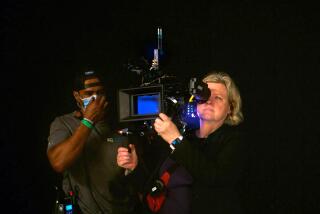Gary Graver, 68; maverick cinematographer tried to complete Orson Welles’ final film
- Share via
Gary Graver, who was Orson Welles’ final cinematographer and waged a decades-long campaign to complete the celebrated director’s final film, “The Other Side of the Wind,” has died. He was 68.
Graver died Thursday at his Rancho Mirage home after a long battle with cancer, said his wife, Jillian Kesner-Graver.
“He was a maverick cameraman who could do anything,” Curtis Harrington, a director who made “Usher” (2002) with Graver, told The Times on Saturday. “He also was very close to Orson, who recognized his wonderful qualities as a human being.”
Welles, who is widely regarded as one of the greatest American filmmakers, “was like a father to him,” Kesner-Graver said. “To finish that film was the most important thing in his life, and Gary passed away without having that chance.”
When Welles died in 1985, the film about a gifted director’s slide toward mediocrity had been in the works for 15 years. Shooting was completed, but there was only about 40 minutes of edited footage.
Graver’s camera work on “The Other Side of the Wind” was “wonderfully gifted in the use of color,” said Kevin Thomas, a longtime movie critic for The Times who is now a freelance contributor. “Gary’s career unfolded almost entirely in the independent realm, so he had to be tremendously resourceful.”
Since “Wind” had to be pieced together from the script and editing notes Welles left behind, Graver had estimated that $3.5 million was needed to complete the project.
“That’s not much money for the film that book-ends ‘Citizen Kane,’ ” Graver told Thomas for a 2004 article in The Times.
The rights to “Wind” -- which featured John Huston, Peter Bogdanovich and Welles’ longtime companion and collaborator Oja Kodar -- had recently been untangled, and Graver was trying to complete a deal with Showtime, said Todd McCarthy, chief film critic for Variety, who was making a documentary with Graver.
Graver’s relationship with Welles dated to 1970, when he called the director at the Beverly Hills Hotel to say he wanted to work with him. Welles replied that the last cinematographer who had called him out of the blue was Gregg Toland, who worked on “Citizen Kane” (1941), Kesner-Graver said.
Welles invited him to visit that day and, surprisingly, asked him to shoot tests for “Wind.”
“I called Orson because I knew we would have the same sense of humor and that we would get along,” Graver said in the 2004 interview. “I knew how to make a movie without much money, and he liked that.”
They worked on 15 projects together, including the documentaries “F For Fake” (1975), “Filming Othello” (1978) and “It’s All True” (1993), released after Welles died, according to a 1998 Hollywood Reporter article.
Often Graver had to drop everything to rush off to Europe to film, and he lived off and on with Welles and Kodar. He still managed to amass dozens of other credits, including filming “Grand Theft Auto,” (1977) Ron Howard’s directorial debut, and shooting several movies for Roger Corman.
Graver was born July 20, 1938, in Portland, Ore. By the time he was in high school, he was producing and starring in a weekly radio show and had built a theater in his basement.
He came to Hollywood at 19 as a prospective actor, but by the late 1960s he was a cameraman. He had developed the skill in 1965 as a member of the Navy Combat Camera Group in Vietnam, his wife said.
Upon returning, he made documentaries before shooting low-budget biker films, including “Satan’s Sadists,” which displayed “excellent, appropriately edgy camera work,” The Times review by Thomas noted in 1970.
Almost until the end of his life, Graver traveled the world trying to keep Welles’ legacy alive, including screening a collection of film clips called “The Unseen Welles.”
In addition to his wife of 25 years, Graver is survived by two sons from earlier marriages, Sean of Tacoma, Wash., and Chris of Los Angeles; his mother, Frances Bolen of Rancho Mirage; and a brother, Geoff, of Austin, Texas.
Services are pending.
More to Read
Only good movies
Get the Indie Focus newsletter, Mark Olsen's weekly guide to the world of cinema.
You may occasionally receive promotional content from the Los Angeles Times.











